KPIs for startups: how to measure success and make data-driven decisions
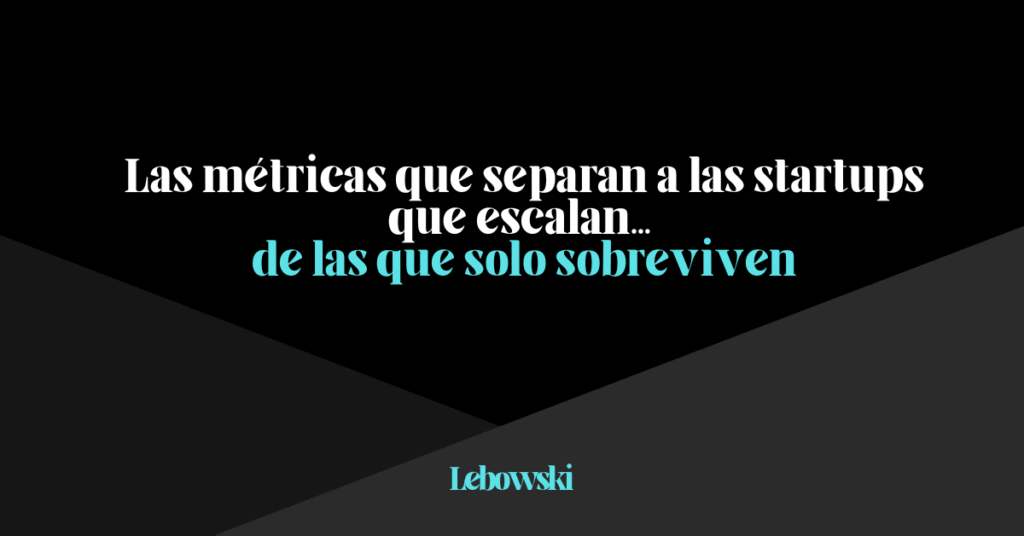
Measuring the success of a startup is not just about looking at the money in the account or the number of followers on networks. It's about understanding if what you're building makes sense, if it's growing and if it's ready to scale, and for that, you need KPIs. And for that, you need KPIs. What are KPIs and why do they matter? KPIs (Key Performance Indicators) are metrics that help you know if your business is going in the right direction. They give you context, focus and a basis for decision making. In a startup, where every resource counts, measuring well is as important as executing well. Essential KPIs for startups (by key area) 1. Business growth 2. Customer acquisition 3. It is a necessity. Startups that measure well understand their business better and make decisions with less intuition and more judgement. Choosing the right KPIs can make the difference between iterating meaningfully or getting lost in the noise. And if you don't know where to start, start with one question: what do I need to know today to make a better decision tomorrow?
Closing Q2 in marketing: 6 actions to finish the quarter strong
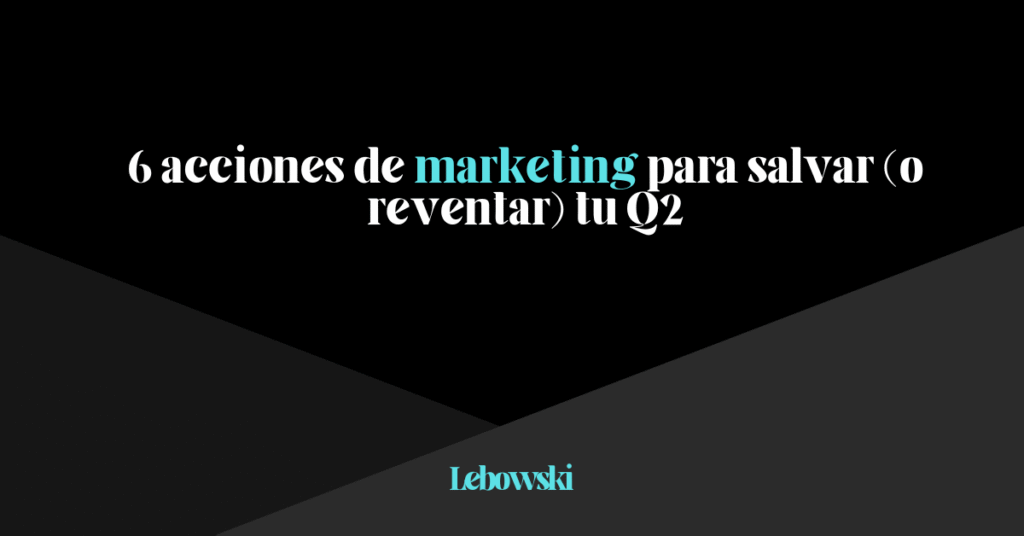
The end of a quarter is not just a time for analysis: it's an opportunity to drive results and close with impact. If you're wondering how to close Q2 in marketing, this article will give you actionable ideas, especially focused on startups and teams that can't afford to improvise. 1. Review your funnel and spot leaks Before launching anything new, make sure what you already have in place is working. Analyse your conversion rates at every stage of the funnel: from visits and leads to demos or sales. Ask yourself: Useful tools: Hotjar, Google Analytics 4, HubSpot 2. Reactivate cold leads from Q2 It's easy to forget the leads that came in in April... but they can still be a play. Launch a specific campaign to reactivate those contacts: Tip: a well-targeted reactivation campaign can yield better results than capturing new leads from scratch. 3. Reinforce your brand positioning before Q3 If your content has been focused on performance, now is a good time to balance it out. Publish: Why it matters: You're setting the stage for your Q3 pipeline to come in hotter. 4. Adjust paid campaigns (and cut what's not working) Don't keep burning budget. Do a quick audit of your active campaigns: Redirect budget to campaigns that are closest to generating real results before the end of the quarter. 5. Coordinate with sales to tighten the close If there is one action that makes a difference at the end of a quarter, it is aligning marketing and sales: 6. Prepare your pipeline for Q3 (now, not in July) Q3 doesn't start on holiday. It starts now: Bonus: If you're short on focus or team, consider adding external support or even bringing in a Fractional CMO to help you structure it. Knowing how to close Q2 in marketing is not about doing more things, it's about doing the right things. These actions will not only help you finish the quarter well, but also help you get to the next quarter with a stronger pipeline and less improvisation. Do you want to review your strategy together before Q3? At Lebowski CMO we work side by side with startups to build marketing plans that scale. 📩 Write to us or schedule a session here.
How to create a marketing plan for startups
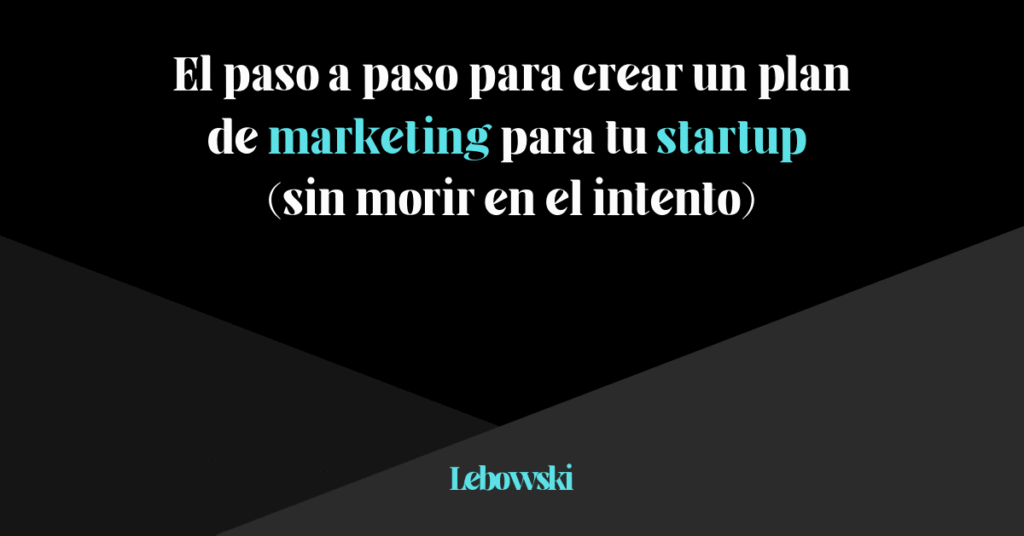
Launching a startup is not just about having a good idea and waiting for magic to happen. It doesn't work like that. If you want your project to grow, connect and sell, you need more than just enthusiasm: you need a startup marketing plan that is well thought out, well executed and adapted to your reality. And no, we're not talking about presentations full of fancy words that go nowhere. We're talking about understanding your business, your market and your people, and building a strategy that makes sense, that you can put in place now and adjust as you go along without going crazy. In this article we are going to guide you step by step so that you can design this plan with your head, with focus and with your feet on the ground. Because marketing, when done well, doesn't just sell: it creates value. Why is it important to have a marketing plan for your startup? OK, first of all: without a marketing plan, you're going in blind. And in the startup world, going aimlessly is not an option. It's not just about "making noise" or being on social media because everyone else is doing it. It's about being clear about who you're targeting, how you're going to reach those people and what you want them to do when they find you. A good marketing strategy will help you: Think of it this way: launching a startup is chaotic enough as it is. Having a marketing plan not only sorts out your ideas, it gives you a solid foundation to build on. And that, believe me, makes the difference between growing in a meaningful way or getting burnt out. The step-by-step to create the marketing plan for your startup Now that we are clear on why you need a plan, let's get down to business. We're not here to complicate things with endless theories or models that only big consultancies understand. This is what you really need to build a solid marketing strategy from scratch. Define your purpose and objectives 2. Know your audience 3. Analyse the market and your competition 4. Choose your channels and tactics 6. Design an action plan 7. Measure, learn and adjust And having a marketing plan for your startup is not an "extra", it is a necessity. It is what allows you to stop improvising, make decisions with criteria and build something that not only works today, but also has a future. And yes, getting it right takes time, head and focus... but you don't have to do it alone. At Lebowski we work as Fractional CMO, which means we get into the kitchen of your business to help you build and execute a marketing strategy as if we were part of your team (because we are). No jargon, no posturing, no remote consulting: side by side, with strategy, experience and real commitment. If your startup is ready to stop shooting in the dark and start growing in a meaningful way, you know where to find us. We help you move from intuition to plan, and from plan to results.
5 Success stories of startups in Spain
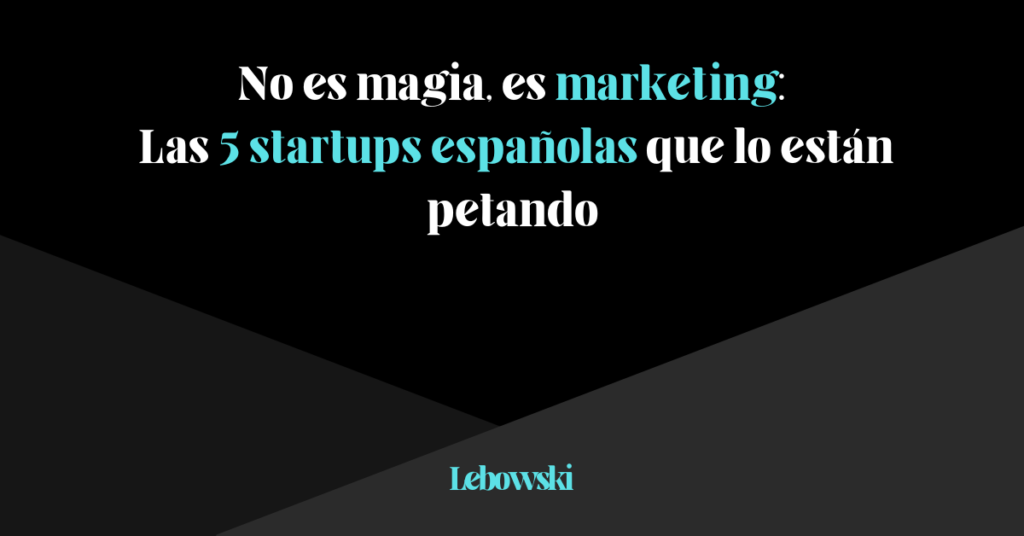
In the startup ecosystem in Spain, every success story has something in common: vision, courage... and a marketing strategy that does not take the motorway, but dares to take the back roads to find its own path. From that idea you jot down on a napkin to becoming a benchmark in the sector is a long road full of obstacles. Believe me, we know it well. In this article we didn't want to focus on impossible unicorns or spectacular investment rounds (although some do fall). We want to talk about Spanish startups that have managed to make marketing a real tool for growth. Teams that understood that branding is not just a pretty logo, and that a good narrative can be worth more than a thousand ads. If you're looking for real inspiration, examples that combine strategy with humanity and creativity with results, stick around. Here are some startups that are making it big... And how they're doing it. What is a startup? But before we get into the subject, let's take it step by step... What exactly is a startup? What differentiates it from a traditional company? A startup is an early-stage company that seeks to grow fast, usually with an innovative and scalable business model. It does not follow the beaten track: it experiments, learns and adapts in record time. Unlike a traditional company, it lives in trial and error mode, with limited resources but a lot of ambition. And in this journey, marketing is not a decoration, it is the essential part. 5 Examples of successful Spanish startups 1. Bamboo Energy Sector: Energy Why it stands out:In a sector as technical as the energy sector, Bamboo Energy has managed to find its own voice. Its proposal is powerful: to help manage energy demand in a more intelligent, flexible and sustainable way. But what is really interesting is how they communicate it. Far from a cold or hyper-technological discourse, Bamboo has opted for an approachable, clear and human narrative, without losing depth. They know that their audience is not only engineers, but also business decision-makers, institutions and citizens who want to understand what the energy transition is all about. Marketing in action: Bamboo Energy is an example of how marketing can be a tool for education and positioning, even in highly technical sectors. 2. Playtomic Sector: Sport Why it stands out: In the midst of padel fever, Playtomic did not limit itself to being an app for reserving courts: it built a digital sports community. They understood that amateur sport is not just about sweating and competing, but also about socialising, organising plans and feeling part of something. Their growth has been unstoppable in Spain and Europe, and a lot has to do with how they have approached their marketing. Marketing in action: Playtomic doesn't just make it easy to play, it makes you want to play. Their marketing understands sport as a social plan, and that makes them more than just a booking app. 3. Freshly Cosmetics Sector: ecommerce Why it stands out: What started as a natural cosmetics brand sold online is now one of the major DTC (direct-to-consumer) benchmarks in Spain. Freshly Cosmetics has been able to build not just a shop, but a loyal community, with marketing based on transparency, sustainability and an aesthetic that appeals to the eye. In a saturated sector, Freshly did not shout louder, but spoke louder. And it worked. Marketing in action: Freshly shows that doing things well also sells. With honest, visually powerful and customer-focused marketing, they have created a brand that is not only liked, but recommended. 4. Heura Foods Sector: Foodtech Why it stands out: If marketing were a martial art, Heura would be a black belt. This startup doesn't just sell plant-based products: it sells a cause, a community and a food revolution. It's not just branding; it's activism. They have achieved what many brands dream of: to be loved and discussed in equal parts, with a brand identity that enters the public conversation without fear and without asking permission. Marketing in action: Heura is not a brand that tries to be liked by everyone. It is a brand with an identity, with clear values and a marketing strategy that is not afraid to be uncomfortable if it means moving forward. 5. Platano Melón Sector: eCommerce Why it stands out:Talking about pleasure without taboos and selling sexual products without falling into clichés and clichés is not easy. But Plátano Melón has managed to do it with naturalness, humour and a lot of brand intelligence. They have positioned themselves as a benchmark brand in sexual wellness, breaking barriers and generating conversation in networks, media and environments where this was not talked about before... at least not so openly. Marketing in action: What all these Spanish startups have in common is not just innovation or growth. It is that they have understood that marketing is not just the icing on the cake, it is an essential part of the cake. So if you are setting up a startup, or you are already up and running and you feel that your message is not getting through... don't look for magic formulas. Look for clarity, consistency and a story worth telling. And if you need someone to help you tell it without smoke and jargon, you know where to find us.
Why a Fractional CMO can be your best investment in pre-seed and seed phase?
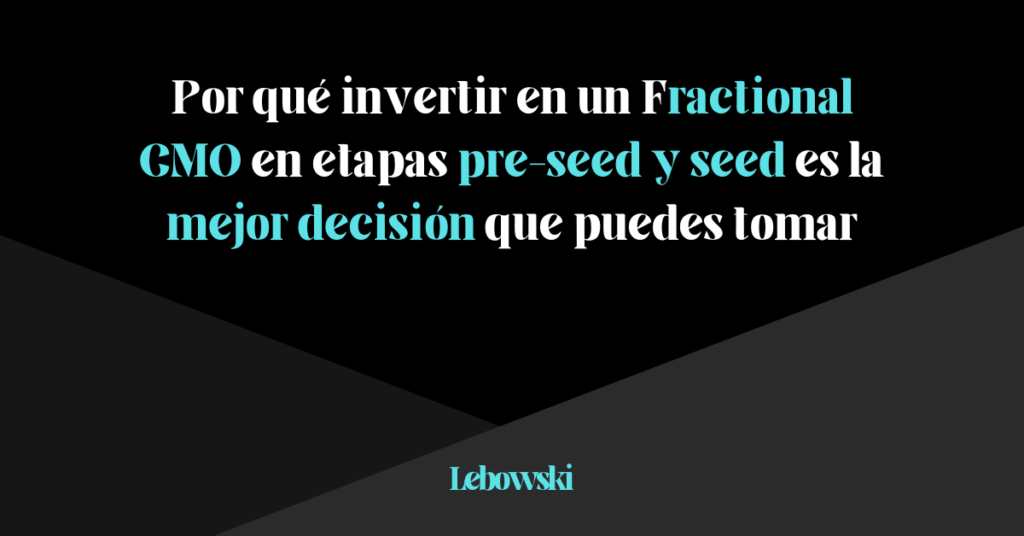
In the early stages of a startup, every euro counts. You have a product you are developing or testing in the market, a team that is growing and a budget that doesn't seem to be enough for everything you need. In this exciting chaos, marketing is often one of the most neglected areas. This is where a Fractional CMO comes in. This flexible leadership model gives you access to a senior marketing director without having to pay the cost of a full-time salary. But why is it so key for pre-seed and seed startups? The importance of marketing in early-stage startups Growth challenges with limited resources Early-stage startups need traction and growth, but often lack the budget for a robust internal marketing team. The impact of a solid marketing strategy A well-designed marketing strategy accelerates product validation, improves customer acquisition and strengthens the brand, laying the foundation for scalability. What you need in the pre-seed and seed stages In the early stages, marketing needs often focus on: How does a Fractional CMO boost your startup in Pre-Seed and Seed? A Fractional CMO not only executes marketing strategies, but defines the vision and roadmap for sustainable growth. Here are some of their key roles: 1. Develop a compelling brand story: Define your narrative, highlighting what makes you unique and ensuring that it connects emotionally with your audience. 2. Create an effective awareness strategy: Design strategies that include digital campaigns, relevant content and key partnerships, ensuring your brand reaches the right audience and stands out from the start. 3. Explore new market opportunities: Research, define entry strategies and tailor your value proposition to maximise impact in each market. 4. Build an engaged community: Lead strategies to create relevant content and manage communities, increasing engagement and strengthening your relationship with customers. 5. Leverage digital channels: Optimise your presence on digital platforms, ensuring that every effort is aligned with your business objectives. 6. Align your value proposition: Review and adjust your value proposition to connect with market expectations. 7. Create customer acquisition and retention strategies: Design ROI-focused acquisition campaigns, while implementing retention strategies such as loyalty programmes and personalised communication. 8. Optimise the conversion funnel: Analyse and adjust each stage of the funnel to improve conversion and reduce friction points. Fractional CMO vs. Internal CMO in Early-Stage Startups Many startups consider hiring an internal CMO to lead their marketing strategy. However, a Fractional CMO may be a better option for several reasons: A Fractional CMO offers the same expertise and leadership as an internal CMO, but with greater flexibility and at a much lower cost. Why is a Fractional CMO key at this stage? In pre-seed and seed stages, every strategic decision has an enormous impact: The first few months of a startup are critical: without a clear strategy, you can waste time and money on ineffective tactics.How to get started? Consult with startup marketing experts Is your startup ready to grow strategically from day one, and do you want your marketing to be aligned with your business goals from the start? At Lebowski, we specialise in working with early stage startups, combining strategic expertise with practical execution. Let's talk!
8 Mobile World Congress 2025 strategies that will transform your startup
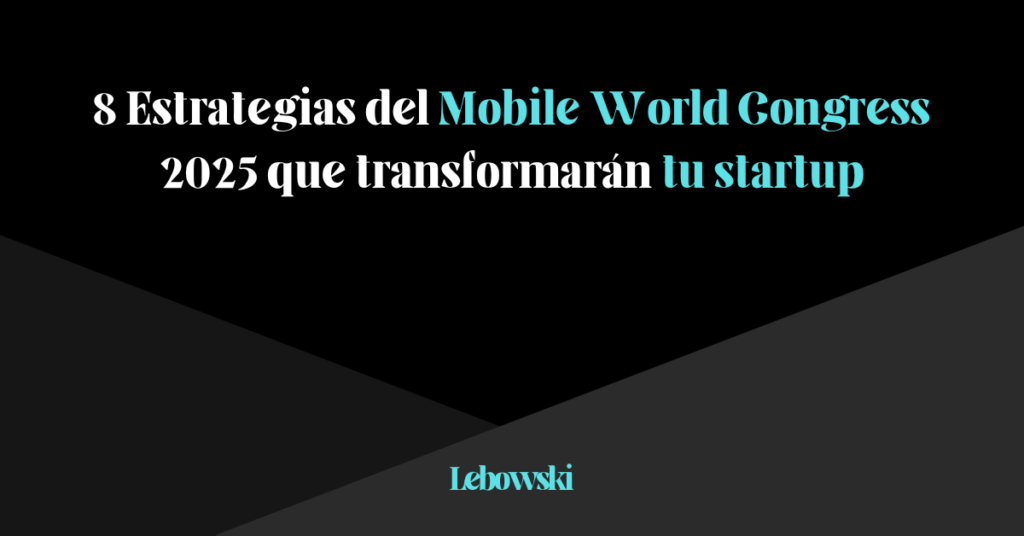
We say goodbye to MWC 2025 in Barcelona, as always, full of ideas, trends and lessons that we want to apply from NOW to our startups. But where to start? The Lebowski CMO team has been taking notes during Mobile World Congress 2025 on what will shape the future of startup marketing. Want to keep your company ahead of the curve? Here are 8 strategies to apply these innovations to your business. Get out your pen and paper and... Let's get down to business! 1. Mobile marketing and 5G: Real-time user experience If there was one thing that marked the Mobile World Congress (MWC) 2025, it was the demonstration of how advanced 5G is revolutionising mobile marketing, enabling more agile and personalised strategies. If you have a startup, this technology offers you the opportunity to improve the user experience through real-time content, more fluid interactions and more precise segmentation. Advanced 5G enables more agile and personalised mobile marketing strategies. Startups can leverage it to optimise the user experience with real-time content (such as live broadcasts of events, product demos, tutorials...), smoother interactions and accurate targeting (because it will have the ability to process large volumes of data in real time). 2. Artificial Intelligence: Automation and personalised content Another of the big stars of MWC 2025 was, unsurprisingly, artificial intelligence, which is undoubtedly transforming startup marketing. On the one hand, generative AI allows content production to be automated. During the Mobile World Congress, for example, tools were presented that are capable of generating personalised content on a large scale, making marketing campaigns more efficient. In addition, these tools can analyse large volumes of data to identify consumer trends and preferences, making it easier (and much easier) to create more accurate marketing strategies. For example, Motorola introduced "Moto AI" within its Smart Connect platform, which makes it easier to write texts and create presentations using voice commands, streamlining creative and operational processes. They also highlighted success stories of companies that implemented virtual assistants to improve their customer service. With these tools you can not only increase customer satisfaction, but also optimise your startup's resources and reduce operating costs. In this case, the Vall d'Hebron University Hospital implemented "Lola", a virtual assistant that monitors prostate cancer patients, collecting health indicators and anticipating possible complications. 3. Hardware innovation: Foldable devices and wearables At Mobile World Congress 2025, innovative devices such as foldable smartphones (Huawei unveiled the Mate XT Ultimate Design, the world's first commercial triple foldable smartphone) and wearables stood out as key tools to enrich the brand experience and interactive marketing. So if I were you, I'd consider how you can leverage these technologies to deliver more immersive and engaging experiences to your users. Are you drawing a blank? Here are some ideas: 4. Sustainable Marketing: The Impact of Green Tech on StartupsSustainability & Green Tech: Responsible Marketing Another of the central themes of MWC 2025 was sustainability and green technology. Formulas were presented for companies to integrate these responsible practices into their marketing strategy, increasingly aligning themselves with the expectations of consumers who are more and more aware of the importance of protecting the environment. How can my startup develop marketing strategies that reflect a genuine commitment to sustainability? Take a look! Sustainable innovations showcased at MWC 2025 Several companies stood out for their green initiatives during the event: 5. Metaverse and Immersive Marketing: Personalisation with AI AI AI-based personalisation and metaverse commerce open up new opportunities to connect with audiences. During Mobile World Congress (MWC) 2025, several companies presented developments that exemplify these trends. Indeed, the metaverse is emerging as an emerging platform for digital commerce, offering virtual environments where brands can interact immersively with consumers. At MWC 2025, key immersive marketing trends in the metaverse were highlighted, such as the creation of personalised experiences, the use of NFTs and digital assets, the implementation of virtual marketplaces and gamification to encourage active user participation. So your startup can't help but take advantage of AI-based personalisation to develop marketing campaigns that adapt in real time to user preferences and behaviours, improving effectiveness and customer satisfaction. You may also consider exploring the metaverse as a sales channel that allows you to create immersive brand experiences, such as virtual shops or interactive events, that attract new audiences and strengthen the loyalty of existing customers. Cybersecurity and privacy: Protecting customer data Cybersecurity and privacy were also discussed, highlighting the implementation of strategies such as biometric authentication (using unique characteristics of individuals such as fingerprints, facial or voice recognition) and the Zero Trust security model (assuming that you can never trust because threats can be both inside and outside the corporate network). Implementing these security strategies not only protects sensitive customer information, but also enhances brand reputation by demonstrating a commitment to privacy and data protection - key factors for customer loyalty in today's digital environment. 7. Extended Reality and Gaming: Engagement with 3D experiences At Mobile World Congress (MWC) 2025, Extended Reality (XR), metaverse and gaming technologies were highlighted as key tools for creating immersive experiences that drive user engagement and loyalty. This is a golden opportunity for your startup to create impactful brand activations and differentiate yourself from your competitors. Fintech and Blockchain: Secure payments and digital trust The integration of digital payments and